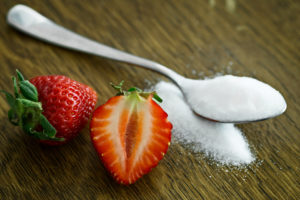Blog
Sugar – Sweet Poison?
Do you have a sweet tooth? Are you on the sugar rollercoaster? Too much sugar is poisoning us. This was the conclusion of David Gillespie, ex-corporate lawyer and father of six, who decided he would investigate for himself why, after trying all sorts of popular diets, he was still 40 kilos overweight. After wading through years of medical research and literature on the subject he realised that it was the sugar in his diet that was keeping him fat. Not only that, he became very concerned by just how dangerous the excessive consumption of sugar is to our health in general. Upon quitting the sugar habit, David Gillespie lost all his excess weight and decided to outline the reasons why sugar is so bad for us in his books, “Sweet Poison – Why Sugar Makes Us Fat” (2008, Penguin, Australia) and the recently published “The Sweet Poison Quit Plan – How to Kick the Sugar Habit and Lose Weight” (2010, Penguin, Australia).

Most of us are already aware on some level that too much sugar is not good for us but do we equate it to poison? Do we really know how much sugar in our diet is too much and do any of us know just how much sugar we are actually consuming in an average day anyway? Are we addicted to sugar and exactly how hard is it to give up the sugar habit anyway? All these questions and more are addressed in the above books, and the answers might surprise you.
There are two components to sugar; sucrose and fructose. Sucrose is converted to glucose in our bodies and becomes usable energy but fructose is converted by our liver immediately to fat which eventually shows up on our waistlines. Obviously this is a very simplified version of a rather complex biochemical process too involved to detail here, but true nevertheless. The other disturbing issue with fructose is that one of the effects of having too much is that our normal appetite control mechanisms become suppressed. In other words, we stop feeling satisfied after eating hence we eat more and more often. All this over-eating of largely sugary foods leads to persistently high blood sugar which in turn leads to obesity and type 2 diabetes, as well as many other chronic health conditions that have been linked to excessive fructose consumption.
As Gillespie points out, “In 1945, only a quarter of the sugar we ate was already in our food when we bought it. Now, more than three-quarters is already in the food.” Food manufacturers add sugar to their products because we like it and this gives them an advantage in the marketplace. Some so-called healthy breakfast cereals are a quarter to a half sugar and we’re not just talking about the obvious ones usually marketed to children. Even worse, often it’s the low-fat variety of food products that contain the most sugar, this is definitely the case with just about everything found in the dairy aisle at the supermarket, especially yoghurt. Supposedly healthy alternatives such as fruit yoghurts often contain just as much sugar as chocolate dairy desserts.
We joke about being ‘chocoholics’ and having ‘sweet tooths’, and make light of our sugar addiction, however this is a habit that may just well be as deadly in the long-term as nicotine or alcohol. Gillespie suggests that if you answer yes to any one of the following questions you’re addicted to sugar:
- Do you struggle to walk past a sugary treat without taking ‘just one’?
- Do you have routines around sugar consumption – for example, always having dessert, or needing a piece of chocolate to relax in front of the TV, or treating yourself to a sweet drink or chocolate after a session at the gym?
- Are there times when you feel as if you cannot go on without a sugar hit?
- If you are forced to go without sugar for 24 hours, do you develop headaches and mood swings?
Be reassured though that you can break the sugar habit, and when you do you can expect to feel better and lose weight, all without feeling deprived. In fact, most people who’ve kicked the sugar habit report they no longer crave or desire sugar at all. They feel satisfied with less food as their bodies’ appetite control systems once again function optimally, and food generally just tastes better.
Vicki Jarvela lives in Brisbane Australia. She is a mother of two vital children, and a recovering sugar addict.
“Well, we have cut out sugar since I left you on Friday a few slip ups with Father’s day but he is a much calmer child we keep thinking is it our imagination but today was amazing. He’s taking his medicine so well I’ve had to mix a bit of juice with the powder but he thinks he’s very cool that he can swallow a tablet. My niece (17) came over today and she said. “Wow he’s been amazing today, he read for me and was so chilled out.” I told her what we are doing and she said. “I will never give him sugar again.” (V.K., mother of Matthew and client of Vital Child).
